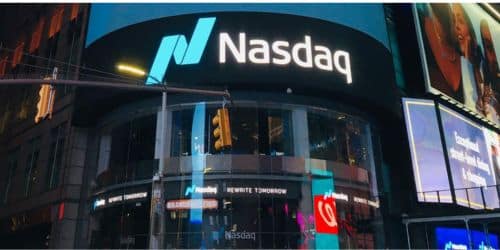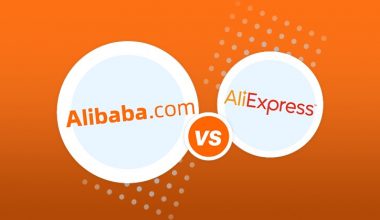The Nasdaq also known as the National Association of Securities Dealers Automated Quotations is the second biggest stock and securities exchange in the world, aside from the (NYSE) New York Stock Exchange. In general, the Nasdaq market attracts more tech- and growth-oriented businesses than other exchanges. The Nasdaq is different from many other exchanges in that it functions as an electronic network instead of a physical trading floor. This exchange has revolutionized the way investors buy and sell stocks, dramatically decreasing transaction times as well as the fees associated with transactions. In this article, we will discuss what Nasdaq is, what Nasdaq 100 is, what Is Nasdaq Composite is, its history, the Nasdaq market cap, and how it works.
What Is Nasdaq, and Where Can I Find It?
Nasdaq is a worldwide electronic marketplace for buying and selling stocks and securities. Nasdaq began as a division of the National Association of Securities Dealers (NASD), now known as the Financial Industry Regulatory Authority (FINRA). However, its name was originally an abbreviation fоr “Nаtіоnаl Association оf Securities Dealers Automated Quоtаtіоnѕ.” The Securities аndExсhаngеCоmmіѕѕіоn (SEC) рuѕhеdthе NASD tоаutоmаtеthеmаrkеtfоrѕесurіtіеѕnоtlіѕtеd on an еxсhаngе, whісhlеd to thесrеаtіоnоfNаѕdаԛ. The fіrѕt electronic trаdіngѕуѕtеmwаѕthеоutсоmе. ThеNаѕdаԛ bеgаnореrаtіоnѕоn February 8, 1971.
What is Nasdaq’s history?
The NASDAQ was established in New York City in 1971 by the National Association of Securities Dealers. Being the first stock market in the world to be managed entirely electronically was the main motivation for its inception. Although it originally prohibited computerized trading, it did provide automatic stock quotations. Furthermore, securities brokers disliked the feature since it contributed to a reduction in the bid-ask spread.
Moreover, the bulk of significant OTC deals soon moved to the National Association of Securities Dealers Automated Quotations from other exchanges. The NASDAQ was the first exchange to provide online trading in 1998. With an emphasis on leveraging technology in finance, NASDAQ Inc. keeps growing its ореrаtіоnѕ beyond a ѕtосkеxсhаngе.
#1. Trading/Business Hours
NASDAQ trading is open between 9:30 a.m. and 4:30 p.m. EST, the same as the New York Stock Exchange. Pre-market (4:00–9:30 am) and after-market (4:00–8:00 pm) trading are also available on the National Association of Securities Dealers Automated Quotations accordingly.
#2. Nasdaq Marketplace Tiers
Based on market capitalization, companies listed on the National Association of Securities Dealers Automated Quotations are divided into three categories:
- the Capital Market,
- the Global Market, and
- the Global Select Market.
Therefore, Stocks with lower market capitalizations and laxer listing criteria may trade on the capital market.
Mid-cap and large-cap stocks are available on the Global Market and Global Select Market, which are subject to stringent corporate governance and liquidity requirements restrictions.
#3. NASDAQ-listed securities/stocks
Essentially, it is well known that the NASDAQ lists stocks from tech companies. Amazon, Alphabet (Google), Facebook, Microsoft, and Apple are a few of the well-known companies whose stocks are traded on the National Association of Securities Dealers Automated Quotations. A stock must fulfill specific financial, governance, and liquidity standards in order to be listed on the National Association of Securities Dealers Automated Quotations.
#4. The Nasdaq Composite
The main and primary index used on the National Association of Securities Dealers Automated Quotation is called the NASDAQ Composite. One of the most frequently watched indexes worldwide, along with the S&P 500 Index and the Dow Jones Industrial Average (DJIA), is the NASDAQ Composite.
The NASDAQ 100, an index of the top 100 non-financial stocks on the National Association of Securities Dealers Automated Quotations, is a market-value-weighted subset of the NASDAQ Composite. 90% of the NASDAQ Composite’s movement may be attributed to the NASDAQ 100.
How Does the Nasdaq Earn Money?
Initially, users of the NASDAQ are charged fees for a number of associated services. The users include both regular investors who pay transaction fees to buy and sell securities and major tech companies that pay a variety of fees to list their securities on the exchange. Corporate services, іnfоrmаtіоn services, market ѕеrvісеѕ, and tесhnоlоgу services make uр NASDAQ Inс.’ѕ fоur primary business ѕеgmеntѕ.
- Corporate Services: Charges are made by businesses seeking to list on the National Association of Securities Dealers Automated Quotations.
- Info Services: Offers users a variety of market data and research to assist market players stay informed.
- Market Services: All transactions are subject to a brokerage and clearance fee.
- Technology Services: These include services for governance, investor relations, and public relations.
What is Nasdaq Composite?
A stock market index made up of over 3,000 stocks listed on the Nasdaq exchange is called the Nasdaq Composite. However, it mostly comprises biotech stocks and companies in the technology sector.
Investors use the Nasdaq Composite to receive a high-level overview of the performance of tech stocks over the course of a day, a week, or a year.
Furthermore, Indexes like the Nasdaq Composite keep track of all the companies that are included in the index’s stock price moves together. The National Association of Securities Dealers Automated Quotations Composite may be used by investors to gauge the market’s direction or to monitor the market’s long-term performance.
Moreover, another common name for the National Association of Securities Dealers Automated Quotations Composite is “the Nasdaq.”
- The real exchange where shares of companies with Nasdaq listings are exchanged is the Nasdaq Stock Exchange.
- The values of the more than 3,000 stocks listed on the National Association of Securities Dealers Automated Quotations exchange are tracked by the Nasdaq Composite index.
The Nasdaq companies
According to market capitalization, the top 20 National Association of Securities Dealers Automated QuotationsNasdaq companies are Apple (AAPL), Microsoft (MSFT), Amazon (AMZN), Meta Platforms (FB), and Apple.
- Alphabet Class C (GOOG)
- Comcast (CMCSA)
- Adobe (ADBE)
- Costco Wholesale (COST)
- PepsiCo (PEP)
- Texas Instruments (TXN)
- Qualcomm (QCOM)
- Tesla (TSLA)
- PayPal (PYPL)
- NVIDIA (NVDA)
- Alphabet Class A (GOOGL)
- Cisco (CSCO)
- Broadcom (AVGO)
- Intel (INTC)
- Netflix (NFLX)
- T-Mobile (TMUS)
Technology-related companies dominate the index, making up over 50% of the whole market cap of the Nasdaq Composite.
The National Association of Securities Dealers Automated Quotations companies are sometimes seen as the greatest indicator of how tech shares are doing by investors due to this weighting that favors tech.
However, there are several additional stock classes available on the Nasdaq market.
- Consumer services make up around 16% of the index.
- Consumer products account for around 8% of the index.
- Financials account for around 8% of the index.
What Is Nasdaq 100?
The Nasdaq 100 is a significant stock market index that includes more than 100 of the largest publicly traded non-financial companies on the National Association of Securities Dealers Automated Quotations Composite Index. Furthermore, it is the second-largest stock exchange in the world.
A weighted market capitalization approach has been used to calculate the Nasdaq 100, or US Tech 100, since its founding in 1985. Consequently, it includes enterprises from a variety of industries, including tech, retail, and healthcare, but excludes financial institutions like commercial and investment banks.
The exchange-traded fund PowerShares QQQ Trust (QQQ) keeps track of the National Association of Securities Dealers Automated Quotations 100 index.
How Is TheNasdaq Calculated?
Market capitalization is used to determine the Nasdaq 100, with the QQQ primarily favoring large-cap technology businesses.
The total value of the index share weights of all index securities, multiplied by the final selling price of each security, and divided by an index divisor, is used to calculate the index value. No Nasdaq 100 company may have a weighted average of greater than 24%.
What Companies Makeup TheNasdaq 100?
Most of the Nasdaq companies are in the technology sector, including Apple, Alphabet, the parent company of Google, and Intel. Companies like Costco Wholesale, a retailer, and Hasbro, a toy manufacturer, are also noteworthy. However, the top 10 companies on the index as of November 2019 are Apple, Microsoft, Amazon, Facebook, Alphabet, Intel, Comcast, Cisco, PepsiCo, and Adobe.
How Do Nasdaq Companies Get Listed?
The Nasdaq 100 only includes companies that are traded on the Nasdaq Global Select Market or the Nasdaq Global Market. Eligibility includes all common stocks, common shares, ADRs, and tracking stocks as security categories.
Other Nasdaq companies must also meet certain requirements, including an average daily volume of 200,000 shares, the submission of quarterly and annual reports, being publicly traded for a minimum of three months, and being clear of bankruptcy proceedings.
According to market capitalization, companies are included or deleted during a quarterly review.
A History Of The Nasdaq 100
The value of the Nasdaq has fluctuated dramatically since its launch in 1985. Starting at 250, the base price has increased steadily ever since, with the Nasdaq 100 price reaching almost 8,000 in November 2019 as tech shares surged.
The index rose beyond 5,000 during the dot-com boom at the start of the 21st century. Due to the popularity of IT companies and poor firm balance sheets, the index became expensive.
When the financial crisis of 2008 occurred, the index suffered along with the rest of the global stock market, but since 2009 it has been on a remarkable bull run that echoes that of other indexes like the larger S&P 500 and the German DAX 30.
What Factors Affect The Price Of The Nasdaq 100?
What Is the National Association of Securities Dealers Automated Quotations 100 Factor That Significantly Affects Its Price? is an excellent question to answer. However, external fundamental forces and stock performance affect the Nasdaq 100 price.
1) Stock activity
A stock’s performance and price, as well as important appointments and new product releases, may all have an effect on the price of the larger index. Events impacting the biggest members are more likely to have an influence on the price of the broader index due to the weighting method.
2) Fundamental elements
In addition to economic performance, which may influence company investment levels and consumer demand for goods, more general economic issues, notably in the US, such as interest rates, monetary policy, and general economic indicators, can also have some impact on the index.
Nasdaq Market Center
The Nasdaq Market Center is an electronic platform for trading Nasdaq-listed securities. The American stock exchange National Association of Securities Dealers Automated Quotations oversees its operations. Furthermore, the system works as a limit order book, which allows participants to post listed orders for any quantity at a specified price. Market makers can access the order book to enter bids and offers. The Market Center matches orders between buyers and sellers and posts completed orders to the public marketplace. The Nasdaq Market Center offers to market, limit, stop, and other orders like the Nasdaq Stock Exchange. Similarly, the system also allows for the trading of options, futures, and other over-the-counter products.
What Is the Difference between Dow and Nasdaq?
The Dow Jones Industrial Average (DJIA) and the National Association of Securities Dealers Automated Quotations Composite are both indices that measure the performance of stocks of different companies. The Dow is an index of 30 blue chip stocks that make up the U.S. market. The National Association of Securities Dealers Automated Quotations is a broader index that consists of more than 3,000 stocks and all types of equities.
Additionally, the Dow price is calculated by the average prices of its thirty component stocks, while the National Association of Securities Dealers Automated Quotations price is calculated by its weighted average of the thousands of stocks that are traded on the exchange. The National Association of Securities Dealers Automated Quotations has a more diverse portfolio with many growth-oriented stocks, while the Dow is composed of large companies that are considered to be more stable.
What Is Nasdaq vs S&P 500?
The Nasdaq and S&P 500 are two of the most widely followed stock market indices in the United States. The National Association of Securities Dealers Automated Quotations is a stock market index made up of more than 3,000 stocks traded on the Nasdaq stock exchange, while the S&P 500 is an index of 500 large-cap stocks traded on the New York Stock Exchange, the American Stock Exchange, and the National Association of Securities Dealers Automated Quotations
The S&P 500 is made up of larger, more established corporations, whereas the National Association of Securities Dealers Automated Quotations is dominated by technology equities. The two indices are often seen as barometers of the broader market, as their performances can often provide insight into the direction of the overall stock market.
What Is Nasdaq Importance?
Tech stocks and firms trading on the Nasdaq, one of the world’s three major stock exchanges, are extremely essential. Moreover, it provides liquidity and funding to tech companies, it is also a leading indicator of stock market health.
As the technology sector grows rapidly, the National Association of Securities Dealers Automated Quotations is seeing improvements in its valuations, and is a great opportunity for both investors and companies alike to access a variety of investments in a simple and cost-effective way.
Conclusion
The Nasdaq exchange offers a unique portfolio of trading opportunities to investors. With its robust order book and liquid market, it is a great choice for experienced and beginning investors alike. Nasdaq’s innovative tools and technology enable price discovery and enable investors to benefit from its depth. With a combination of decentralization, liquidity combined with the ability to access an array of tools and features, National Association of Securities Dealers Automated Quotations is one of the most attractive options to investors seeking to access the market.
What Is Nasdaq FAQs
What Is Nasdaq in Simple Terms?
Nаѕdаԛ іѕаn acronym fоrthеNаtіоnаl Aѕѕосіаtіоn оf Sесurіtіеѕ Dеаlеrѕ Automated Quotations. It is a stock exchange where companies list their stocks and investors can buy and sell shares. It is home to some of America’s biggest tech companies, like Apple, Microsoft, and Amazon.
What Exactly Does Nasdaq Do?
Nasdaq is an American stock exchange that is home to many of the world’s leading companies. They offer over 3,000 global equities, including major tech, financial, biotech, and other companies. Nasdaq’s automated trading system enables buyers and sellers to quickly and easily trade stocks.
What is Nasdaq100 Trading Hours?
National Association of Securities Dealers Automated Quotations operates with four trading sessions: pre-market from 4:00 am to 9:30 am ET, regular market from 9:30 am to 4:00 pm ET, after-market from 4:00 pm to 8:00 pm ET, and closing auction from 4:00 pm to 8:30 pm ET.
What Is the Highest Nasdaq Has Ever Been?
The Nasdaq has reached an all-time high of 12,973.37 on February 16, 2020.
Related Articles
- Tech Companies To Invest In: Top Companies In 2023 (Updated!)
- NYSE Composite: What Does It Mean?
- ELECTRIC CAR STOCKS: Best Ones in 2023 to Buy Now!!! (+ Free Tips
- IS STOCK MARKET OPEN ON BLACK FRIDAY? Stock Market Holidays
- HOW TO INVEST IN S&P 500: Baby Step The most Popular Options In 2023 (Updated)






